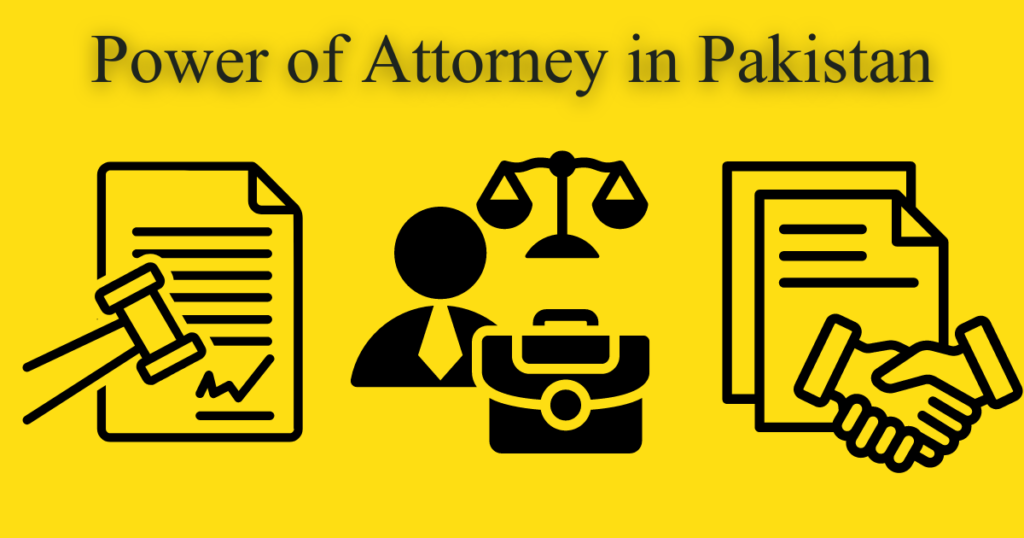
What is Power of Attorney (PoA):
The Power of Attorney Act of 1882, a key piece of legislation in Pakistan, thoroughly outlines the legal aspects of granting Power of Attorney. Section 2 of this Act specifies that: “A Power of Attorney (In Urdu known as “Mukhtar Nama”) is an essential legal document in Pakistan. It allows an individual, referred to as the Principal, to give authority to another person, known as the Attorney, to act on their behalf in legal and financial matters.” This arrangement is often necessary when the Principal cannot manage their affairs due to being abroad, lacking time, or facing physical or mental incapacity. The Attorney can handle tasks such as representing the Principal in court, managing property transactions, or making medical and financial decisions. It’s important to ensure that a Power of Attorney is properly drafted and executed to prevent any legal complications. This document can be revoked by the Principal unless it grants specific rights to the Attorney that cannot be withdrawn. It also becomes void when its purpose is fulfilled or upon the death of either party. Understanding and correctly using a Power of Attorney is crucial for managing one’s affairs effectively.
Legal Terminologies related to Power of Attorney:
Here are a few crucial legal terms related to the Power of Attorney that you should be familiar with:
- Principal/Donor/Grantor: The individual who provides another person with the authority to make decisions or act on their behalf, either in a limited or broad capacity.
- Agent/Attorney-in-fact: The person who is granted the authority to act on behalf of the Principal, as specified in the Power of Attorney. This individual can have either restricted or extensive legal authority to manage the Principal’s assets, financial affairs, and other legal matters.
Types of Power of Attorney:
In Pakistan, there are three main types of Power of Attorney:
1. Special Power of Attorney (Mukhtaar-nama Khaas)
2. General Power of Attorney (Mukhtaar-nama Aam)
3. Legal Power of Attorney (Vakalat-nama)
- Special Power of Attorney (Mukhtaar-nama Khaas): A Special Power of Attorney is a legal document that allows an individual abroad to appoint a representative to carry out specific actions explicitly mentioned in the document, primarily in legal matters (such as filling appeals, hiring lawyers or representing principal in the court). It can generally be revoked after the completion of specific task specified in the document.
- General Power of Attorney (Mukhtaar-nama Aam): A General Power of Attorney grants an individual authority to act on behalf of the principal, primarily for property related matters. This can include conducting property transactions (such as selling, buying, leasing, and managing property). The terms and conditions of the authority granted must be specified in the document, and it can be either revocable or non-revocable based on the principal’s preference.
- Legal Power of Attorney (Vakalat-nama): A Legal Power of Attorney is used to authorize a lawyer to represent the principal in court cases. It informs the court or relevant department that a lawyer will handle legal matters on behalf of the principal in a specific case (such as filling defending or withdrawing case, submitting evidences, executing documents and correspondence etc). This document allows the lawyer to manage legal proceedings but does not permit them to personally represent the principal. It can be revoked either by principal or on completion of the case.
It is important to note that a Power of Attorney must be registered and recognized by the city in which it is being used, as stipulated in 2005 YLR 2623.
Registration process of Power of Attorney in Pakistan:
The registration of a Power of Attorney (PoA) in Pakistan involves several steps to ensure its legality and enforceability. The process can be divided into the following steps:
- Drafting the Power of Attorney Document: The PoA document should clearly state the powers being granted, the identities of the principal (the person granting the power) and the attorney (the person receiving the power), and any specific conditions or limitations. It is advisable to seek legal counsel to ensure that the document complies with Pakistani laws and covers all necessary aspects.
- Stamp Paper: Obtain the appropriate stamp paper for the PoA usually of Rs.1000. The value of the stamp paper may vary depending on the nature of the PoA and the province.The PoA must be executed on the stamp paper, signed by the principal, and witnessed by at least two individuals.
- Attestation: If the principal is in Pakistan, the PoA must be attested by a Notary Public. If the principal is abroad, the PoA must be attested by the Pakistani Consulate or Embassy in the respective country.
- Biometric Verification: The principal and witnesses must complete biometric verification forms, which include providing fingerprints. These forms are submitted along with the PoA document.
- Fee Payment: Pay the required registration fee, which is typically 1% of the property or asset value if the PoA is property-related. For non-property PoAs, the fee may be lower. Fees can be paid online or at designated banks.
- Submission to Registrar: Submit the attested PoA, biometric verification forms, and proof of fee payment to the Registrar at the District Courts under section 17 of the registration Act 1908. The Registrar will verify the documents and may require the presence of the principal and witnesses for further verification.
- Registration and Issuance: Upon successful verification, the Registrar will register the PoA. A certified copy of the registered PoA will be issued to the principal, which can then be used for the intended purposes.
Documents required for registration of Power of Attorney:
To register a Power of Attorney (PoA) in Pakistan, you’ll need to gather several key documents. Here’s a comprehensive list:
- The main legal document that grants authority to the agent, clearly outlining the powers given.
- Government-issued ID such as a passport, CNIC (Computerized National Identity Card), or driver’s license of both Principal and Agent.
- Utility bills (electricity, water, gas), bank statements, or any official document showing the current address of both Principal and Agent.
- Recent passport-sized photographs of both the principal and the agent.
- Completed forms for both the principal and the agent, including fingerprints.
- Proof of identity for at least two witnesses, such as CNICs.
- The PoA must be executed on the appropriate stamp paper, which varies by province and the nature of the PoA.
- Receipt of the registration fee payment.
Cancellation of Power of Attorney:
To revoke a Power of Attorney in Pakistan, one must submit a Revocation Deed to the registrar, along with a newspaper publication announcing the revocation and the reason for the withdrawal (Reference 2017 CNC P48 Isb). Once this process is complete, only then can a new Power of Attorney be issued.
A Special Power of Attorney automatically becomes void once the specific task it was created for is completed. Additionally, it expires upon the death of either the representative or the principal (executant).
For a more detailed understanding, the cancellation process also involves the following steps:
1. Drafting the Revocation Deed: This document formally states the intent to revoke the Power of Attorney, including the reason for cancellation and details of the original document.
2. Notarization: The Revocation Deed should be notarized to add a layer of legal authentication.
3. Registration: The notarized Revocation Deed must be submitted to the local registrar’s office where the original Power of Attorney was registered. This ensures that the revocation is officially recorded.
4. Public Notice: A notice of the revocation should be published in a widely circulated newspaper to inform the public and any relevant parties of the cancellation. This step helps prevent any misuse of the revoked Power of Attorney.
5. Notification to the Attorney: The principal should formally inform the attorney (the person who was given the power) about the revocation, ideally through a written notice sent via registered mail to ensure proof of receipt.
According to legal practices, if the Power of Attorney was granted for specific transactions or matters, the completion of those tasks automatically terminates the authority granted. For instance, if the Power of Attorney was created for a property sale, it ceases to be valid once the sale is finalized.
It’s also crucial to note that if the principal dies, the Power of Attorney is automatically revoked, as the authority granted through the document is inherently tied to the principal’s existence. In cases where multiple Powers of Attorney exist, the most recent one usually takes precedence, provided the earlier ones were properly revoked.
FAQs:
Who issues a Power of Attorney in Pakistan?
In Pakistan, an Executor can delegate authority to an Attorney to act on their behalf in certain matters by issuing a Power of Attorney.
Can you sell property with a Power of Attorney in Pakistan?
Yes, you can sell property with a Power of Attorney.
What to Include in Your Power of Attorney?
When drafting your Power of Attorney, it’s essential to provide comprehensive details to prevent future issues. Clearly specify any properties or assets that the Power of Attorney will address. If you want to limit the responsibilities or financial management capabilities of your Representative, you can include specific clauses to reflect these restrictions.
Fraud in Power of Attorney Cases?
In Pakistan, Representatives who act against the directives of the Executant may face charges of Criminal Breach of Trust. Likewise, individuals involved in document forgery, including lawyers, can be subject to legal prosecution.


One Response